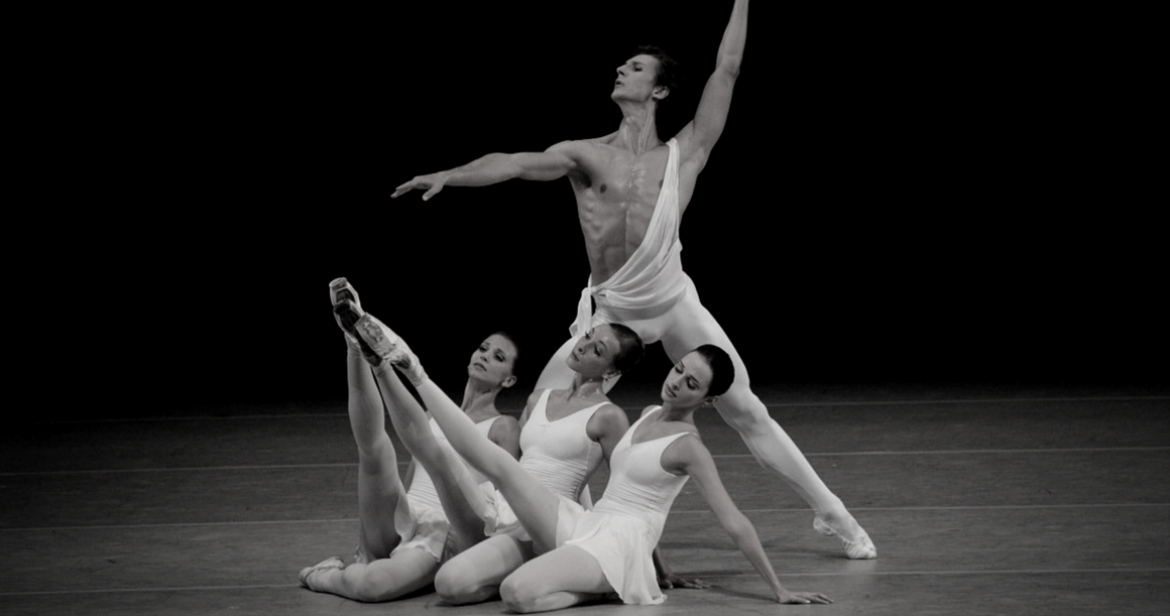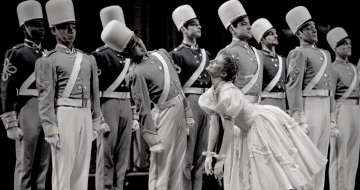APOLLO MUSEGETE
Primo arrangiamento coreografico : Adolph Bolm
Musiche: Igor Stravinskij
Prima Rappresentazione: 1928 Washington
Successivo arrangiamento coreografico: George Balanchine, Parigi 1928
La versione più conosciuta e rappresentata è quella creata da Balanchine espressamente per i Balletti Russi di Diaghilev, versione che ha condotto alla notorietà e successo tale balletto. L’opera e divisa in due quadri e rientra nella tipologia neoclassica dei balletti. Il balletto, ispirato ad un soggetto mitologico, è ambientato in un’isola dell’Egeo, Delo, unico luogo in cui la povera Leto trova rifugio per dare alla luce il figlio della divinità Zeus che chiamerà Apollo. La particolarità di quest’ultima divinità è che appena nato ha già le sembianze di adulto, per cui svincolatosi dalle bende riceve, in dono da due divinità, un liuto. Convoca a sé le tre muse che rappresentano l’arte Calliope, Polimnia e Tersicore e comincia ad insegnare loro, ciascuna nella propria arte, la disciplina che singolarmente rappresentano, diventando, di fatto il loro Maestro. Dunque, danza e suona insieme alle tre Muse e consegna alla prima Calliope, dea della poesia, una tavoletta, alla seconda Polimnia, divinità della mimica, una maschera e per finire a Tersicore, dea della danza, una lira. In realtà tra le tre, soltanto quest’ultima riuscirà così bene ad apprendere ed a seguire gli insegnamenti di Apollo da ottenere le sue lodi. Tutte le Muse guidate da Apollo si dirigono verso il Monte Parnasso, in questo modo si separa definitivamente dalla madre Leto.











The Aviator game has quickly solidified its position as a essential part in the realm of online betting, drawing the enthusiasm of participants with its distinct blend of excitement and deliberate gameplay. This game offers an dynamic betting format, where users place their investments on a virtual aircraft that takes flight and elevates into the sky. The main fascination for participants lies in the critical choice of when to cash out; as the plane rises, the potential multiplier grows, improving the prospects of massive rewards. However, there is a significant risk involved—if participants delay their exit too long, they risk missing out on their complete stake, adding an intense layer of drama to the gameplay. This subtle balance between hazard and reward is what makes the aviator games so fascinating, as players must continuously weigh their decisions and make rapid decisions under duress.
Numerous sites now host the Aviator game, providing players with a variety of options to engage with. Among these, 1win is a prominent choice, where users can easily access the 1win aviator game and enjoy an user-friendly interface designed to improve their interaction. In contrast, Parimatch is another recognized option, featuring the parimatch aviator game with its robust service and wide range of investment options. Each platform not only provides the game but also provides various bonuses and user-friendly features that cater to both new players and seasoned participants. Players can select based on their needs, ensuring that they find an venue that amplifies their overall experience and maximizes their winning potential.
URL: https://yogicentral.science/wiki/User:MariCreamer7
A particularly intriguing aspect of the Aviator game is the introduction of predictors, which are designed to enhance players’ chances of success. Tools such as the aviator predictor and predictor aviator have gained attention among gamblers seeking an edge in their gameplay. These predictors analyze historical game data to provide advice and propose optimal cash-out points based on previous flight patterns. For tech-savvy participants, the aviator predictor apk is available for download, making it easier to access predictive analytics directly from their mobile devices. While these tools can undoubtedly offer valuable insights, users should employ them mindfully. It is important to recognize that no predictor can guarantee a win in a game that heavily relies on chance, and placing too much faith in these tools can lead to frustration. Instead, players are encouraged to blend predictive analytics with their own observations and experiences, thereby fostering a more comprehensive understanding of the game's dynamics.